Grindcore is an extreme fusion genre of heavy metal and hardcore punk that originated in the mid-1980s, drawing inspiration from abrasive-sounding musical styles, such as thrashcore, crust punk, hardcore punk, extreme metal, and industrial. Grindcore is considered a more noise-filled style of hardcore punk while using hardcore's trademark characteristics such as heavily distorted, down-tuned guitars, grinding overdriven bass, high-speed tempo, blast beats, and vocals which consist of growls and high-pitched shrieks. Early groups like Napalm Death are credited with laying the groundwork for the style. It is most prevalent today in North America and Europe, with popular contributors such as Brutal Truth and Nasum. Lyrical themes range from a primary focus on social and political concerns, to gory subject matter and black humor.
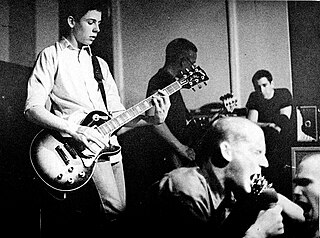
Hardcore punk is a punk rock music genre and subculture that originated in the late 1970s. It is generally faster, harder, and more aggressive than other forms of punk rock. Its roots can be traced to earlier punk scenes in San Francisco and Southern California which arose as a reaction against the still predominant hippie cultural climate of the time. It was also inspired by New York punk rock and early proto-punk. Hardcore punk generally disavows commercialism, the established music industry and "anything similar to the characteristics of mainstream rock" and often addresses social and political topics with "confrontational, politically-charged lyrics."

My War is the second studio album by American band Black Flag. It polarized fans on its release in 1984 on SST Records over the LP's B-side, on which the band added heavy metal influences by slowing the tempo and adding ponderous guitar riffs, despite the reputation the band had earned as leaders in fast hardcore punk on its first album, Damaged (1981). It is regarded as one of the first post-hardcore albums.

Agnostic Front is an American hardcore punk band from New York City. Founded in 1980, the band is considered an important influence to the New York hardcore scene, as well as for pioneering the crossover thrash genre.
A number of heavy metal genres have developed since the emergence of heavy metal during the late 1960s and early 1970s. At times heavy metal genres may overlap or are difficult to distinguish, but they can be identified by a number of traits. They may differ in terms of: instrumentation, tempo, song structure, vocal style, lyrics, guitar playing style, drumming style, and so on.

Earth Crisis is an American hardcore punk band from Syracuse, New York, United States, active from 1989 until 2001, reuniting in 2007. Since 1993 the band's longest serving members are vocalist Karl Buechner, lead guitarist Scott Crouse, bassist Ian Edwards and drummer Dennis Merrick. Their third and current rhythm guitarist Erick Edwards joined the band in 1998.
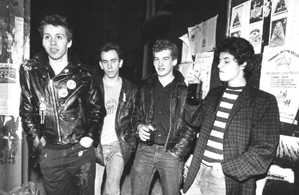
The Teen Idles were an American hardcore punk band formed in Washington, D.C. in September 1979. Consisting of teenagers Nathan Strejcek, Geordie Grindle, Ian MacKaye and Jeff Nelson, they recorded two demo sessions and the 1980 Minor Disturbance EP before breaking up in November 1980. The influential independent record label Dischord Records was originally created with the sole purpose of releasing The Teen Idles Minor Disturbance 7" record. They were an early landmark in the D.C. hardcore movement, and MacKaye and Nelson would later form the seminal punk rock outfit Minor Threat.
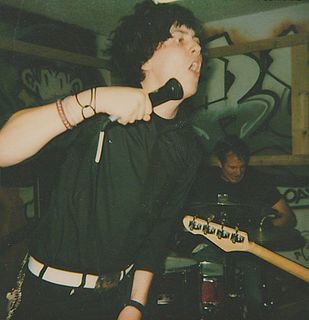
Screamo is an aggressive subgenre of emo that emerged in the early 1990s, emphasizing "willfully experimental dissonance and dynamics". It was pioneered by San Diego bands Heroin and Antioch Arrow and developed in the late 1990s mainly by bands from the East Coast of the United States such as Orchid, Saetia, and Pg. 99. Screamo is strongly influenced by hardcore punk and characterized by the use of screamed vocals. Lyrical themes usually include emotional pain, death, romance, and human rights. In the 21st century, the term "screamo" has often mistakenly been used as an umbrella term for any music that features screamed vocals.
Crust punk is a form of music influenced by English punk rock and extreme metal. The style, which evolved in the early-1980s in England, often has songs with dark and pessimistic lyrics that linger on political and social ills. The term "crust" was coined by Hellbastard on their 1986 Ripper Crust demo.
Sludge metal is a genre of heavy metal music that originated through combining elements of doom metal and hardcore punk. It is typically harsh and abrasive, often featuring shouted vocals, heavily distorted instruments and sharply contrasting tempos. The Melvins from the US state of Washington produced the first sludge metal albums in the mid-late 1980s.
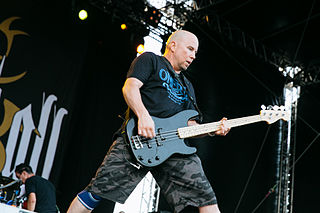
Thrashcore is a fast tempo subgenre of hardcore punk that emerged in the early 1980s. Thrashcore is essentially sped-up hardcore, often using blast beats. Songs can be very brief, and thrashcore is in many ways a less dissonant, less metallic forerunner of grindcore. The genre is sometimes associated with skateboarder subculture.
Post-hardcore is a punk rock music genre that maintains the aggression and intensity of hardcore punk but emphasizes a greater degree of creative expression initially inspired by post-punk and noise rock. Like post-punk, the term has been applied to a broad constellation of groups. Post-hardcore began in the 1980s with bands like Hüsker Dü and Minutemen. The genre expanded in the 1980s and 1990s with releases by bands from cities that had established hardcore scenes, such as Fugazi from Washington, D.C. as well as groups such as Big Black and Jawbox that stuck closer to post-hardcore's noise rock roots. In the 2000s, post-hardcore achieved mainstream success with the popularity of bands like My Chemical Romance, Dance Gavin Dance, AFI, Underoath, Hawthorne Heights, The Used, At the Drive-In and Senses Fail. In the 2010s, bands like Sleeping with Sirens and Pierce the Veil, both of which being labeled as post-hardcore, achieved mainstream success. Meanwhile, bands like Title Fight and La Dispute experienced underground popularity.

Discharge are an English hardcore punk band formed in 1977 in Stoke-on-Trent by Terence "Tezz" Roberts and Royston "Rainy" Wainwright. While the band has undergone several line-up changes throughout its history, the classic line-up from the early 1980s featured bassist Wainwright, drummer Gary Maloney, guitarist Anthony "Bones" Roberts, and vocalist Kelvin "Cal" Morris.
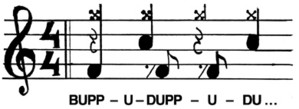
D-beat is a style of hardcore punk, developed in the early 1980s by imitators of Discharge, after whom the genre is named, as well as a drum beat characteristic of this subgenre. D-beat is known for its "grinding, distorted and brutally political" sound. Discharge may have themselves inherited the beat from Motörhead and the Buzzcocks. D-beat is closely associated with crust punk, which is a heavier, more complex variation. The style was particularly popular in Sweden, and developed there by groups such as Crude SS, Anti Cimex, Mob 47, and Driller Killer. Other D-beat groups include Doom and the Varukers from the UK; Disclose from Japan; Crucifix and Final Conflict from the U.S.; Ratos de Porão from Brazil; and MG15 from Spain. While the style initially developed in the early 1980s, a number of new groups working within the subgenre emerged in the mid-1990s. These include the Swedish groups Wolfbrigade, Totalitär, Avskum, Skitsystem, and Disfear.
Mathcore is a subgenre of hardcore punk and metalcore influenced by post-hardcore, extreme metal and math rock that developed during the 1990s. Bands in the genre emphasize complex and fluctuant rhythms through the use of irregular time signatures, polymeters, syncopations and tempo changes. Early mathcore lyrics were addressed from a realistic worldview and with a pessimistic, defiant, resentful or sarcastic point of view.
Folk punk is a fusion of folk music and punk rock. It was popularized in the early 1980s by the Pogues in Britain, and by Violent Femmes in the United States. Folk punk achieved some mainstream success in that decade. In more recent years, its subgenres Celtic punk and Gypsy punk have experienced some commercial success.

The Faith was an early American hardcore punk band, from Washington D.C., with strong connections to the scene centered on the Dischord label. Along with Minor Threat, The Faith were key players in the early development of hardcore, with a (later) melodic approach that would influence not just associated acts like Rites of Spring, Embrace and Fugazi, but also a subsequent generation of bands such as Nirvana, whose Kurt Cobain was a vocal fan.
Since the mid 1970s, California has had thriving regional punk rock movements. It primarily consists of bands from the Los Angeles, Orange County, Ventura County, San Diego, San Fernando Valley, San Francisco, Fresno, Bakersfield, Alameda County, Sacramento, Lake Tahoe, Oakland and Berkeley areas.
Street punk is an urban working class-based subgenre of punk rock, partly as a rebellion against the perceived artistic pretensions of the first wave of British punk. Street punk emerged from the style of early Oi! bands such as Sham 69 and Cockney Rejects, and the Oi! bands that followed them such as Blitz, The Business and Angelic Upstarts. A key band in defining the aesthetic was The Exploited. However, street punk continued beyond the confines of the original Oi! form with bands such as GBH, Chaos UK, Discharge, The Anti-Nowhere League and Oxymoron. Street punks generally have a much more ostentatious and flamboyant appearance than the working class or skinhead image cultivated by many Oi! groups. Street punks commonly sported multi-coloured hair, mohawks, tattoos, heavily studded vests and leather jackets, and clothing, especially plaids, adorned with political slogans, patches, and/or the names of punk bands.

T.S.O.L. is the eponymously titled debut EP by the American hardcore punk band T.S.O.L., released in 1981 through Posh Boy Records. Its fast tempos and politically radical lyrics established the band as a major force in the southern California hardcore scene of the time. T.S.O.L. quickly moved away from leftist political subject matter, however, shifting in a gothic rock direction and changing labels to Frontier Records for their full-length album Dance with Me (1981). This led to a dispute with Posh Boy owner Robbie Fields, who claimed the band owed his label another EP. The two parties eventually reached a settlement in which Posh Boy gained the rights to T.S.O.L.'s 1982 EP Weathered Statues, combining it with the debut EP in the 1987 compilation album Thoughts of Yesterday: 1981–1982. Nitro Records purchased the master recordings from Posh Boy in 1997 and re-released the two EPs as the compilation T.S.O.L. / Weathered Statues.










